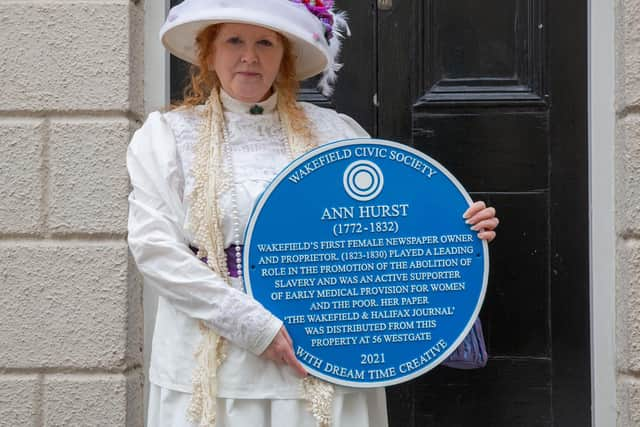'Visionary' Wakefield editor Ann Hurst who campaigned for women's rights and abolition of slavery honoured with blue plaque
and live on Freeview channel 276
Ann Hurst took over The Wakefield and Halifax Journal following her husband’s death in 1823.
Having worked at the heart of her community for years, Ann used her newspaper as a platform to call for radical change, issuing propaganda calling for the abolition of slavery and suffrage for women.
Advertisement
Hide AdAdvertisement
Hide AdAnn’s work has been directly linked to the election of Daniel Gaskell, the city’s first liberal MP, whose political platform included calling for the abolition of slavery and reform of the Church.


Her incredible story was uncovered by a team of volunteers working for the Forgotten Women of Wakefield.
Backed by the Express, the grassroots project is seeking to tell the stories of the women who helped shape Wakefield’s past.
Ann’s blue plaque, which will be hung close to her former home on Westgate, is one of more than a dozen that the FWW team have secured.
Advertisement
Hide AdAdvertisement
Hide AdSarah Cobham, founder of Dream Time Creative, the company behind the project, said: “Ann was known for being radical and liberal.


“She wasn’t frightened to lead by example and took people with her.
“The whole idea of this was to elect Daniel Gaskell MP. She influenced the way the voters moved.
“When I first set out on this I just wanted it to be normal for women’s achievements to be known about, seen and heard.
“And I feel as if we are very much getting that now.”
Advertisement
Hide AdAdvertisement
Hide AdWith the help of funding from Wakefield Council, Historic England and Wakefield Civic Society, the FWW team have been able to lead a number of community projects, both before and during lockdown.
Their latest scheme, which involved working with local community groups, saw the creation of dozens of peg doll figurines for an exhibition at Wakefield Library.
The display commemorates The Great Pilgrimage of 1913, which saw more than 10,000 women march through Wakefield city centre demanding the right to vote.
It will stay in place, visible from the Burton Street windows, until April 12.